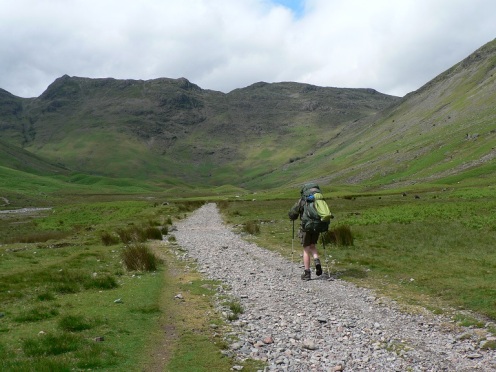Great Langdale to Langstrath
Sheltered in the campsite behind a hedge we didn’t get the bashing we expected overnight, and by about 11am the clouds started to clear and I was itching to get started. Our objective for the day was to climb up and over Stake Pass and descend into the wilds of Langstrath to camp. Hikers coming over the pass from the north reported reasonable visibility and we set off confident of better weather. Despite 4 days on the trail neither of us had a blister or any other joint/muscle pains, in fact we felt much fitter than expected. Perhaps pounding around those Cambridgeshire fields with rucksacks each night after work is doing some good after all!
Heading up Mickledon towards Stake Pass.
As we hiked up the valley of Mickledon, rifts of blue sky appeared and the sun was warm. The river to our left was in spate from the overnight rains, and as the valley began to enclose us I was reminded of those stark river valleys in the Himalaya, it felt like we were walking into a truly wild place. Before attempting the pass, we stopped by an old sheep fold and cooked some noodles for extra energy. Once again the sky was darkening and the cloud base descending, but we pushed on and settled into a steady pace up the zig-zags of Stake Pass. The pass forms part of an old pack-horse route between Keswick and Langdale, so underfoot the trail was often cut and laid, making for a steady, if prolonged ascent.
View from the top of Stake Pass looking back down Mickledon towards Langdale.
I reached the top first and quickly put on extra layers. As I waited a met two walkers descending out of the mist, they had been summit bagging for the day as preparation for a 2 week trek of the Mont Blanc Trail this summer….definitely another trek on the radar for the future. By the time Barry reached the top it was grey, cold and windy, we hiked quickly through a high basin of moraines and marsh, eager to catch a first glimpse of Langstrath and start descending to shelter. Langstrath is the longest uninhabited valley in the Lake District and had, I was told, plenty of good places to camp. On our first impression we were not disappointed as the valley opened cavernously before us, waterfalls cascaded down the mountainside and the river glinted below.
Barry starting the dramatic descent into Langstrath
Arriving at the valley floor, we could find nowhere sheltered, or flat or free of sheep dung to pitch the tent. It was a bleak prospect and a big disappointment. Tired and frustrated we decided to hike on down the valley in the hope of finding a wall or boulder as the wind was now gusting 35-40mph. It became clear as we crossed grass lawns covered in sheep dung, that Langstrath is not so much wild as bleak and heaving with sheep. Sometimes when wild camping, things don’t work out, and decisions have to be made at the last minute when we are tired. In the end we just picked a flat spot lower in the valley and set up, the wind nearly flattened our tent (Hubba Hubba HP) and we had to prop our rucksacks in the windward porch to stop it collapsing. At times like this wild camping can be a bit grim and we question if it is worth it, but that is the nature of putting ourselves ‘out there’, and is a price we are willing to pay to experience those high moments when the universe conspires to make things perfect.
Haute Cuisine. Sheltering behind a boulder to cook couscous and tuna in windswept Langstrath.
Mental attitude is everything,and after venting a few choice words to the valley winds, we worked together to make camp and get warm. When hiking I would estimate that 90% of my effort is mental, and I am amazed at how my motivation, level of tiredness (or perceived tiredness) and tolerance of pain vary with my attitude. As a couple undertaking a long distance hike we realise that we can really help to keep each other positive, and that we need to watch out for the times when we are both down, as these are the times when we are most likely to make excuses and give up.
Our camp in Langstrath. Note the trekking pole rigged to a guy on the windward side for extra anchorage.
The wind continued throughout the night, and the tent was buffeted making sleep difficult. Overall we are very pleased with the Hubba Hubba HP but may have found its limitation in windy weather. A few extra guy attachments would have been very useful, and we need to give more thought to how we can handle the tent better in wind, not least the powerful gusts associated with violent summer thunderstorms in the Pyrenees.







